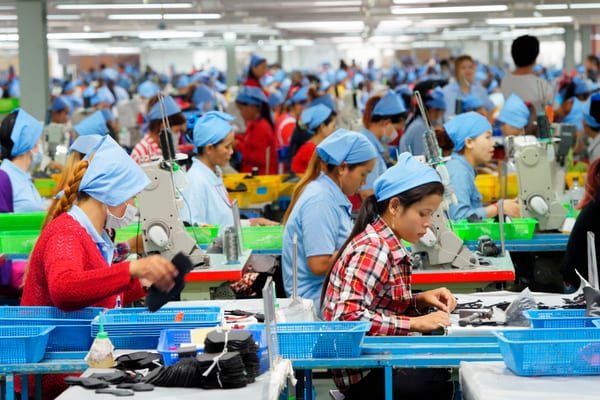Improving Development Outcomes Through the Responsible Recruitment of Migrant Workers
16 May 2022

This Monday, governments meet at the United Nations in New York for the first International Migration Review Forum - an intergovernmental platform to discuss and share progress on the implementation of The Global Compact for Safe Orderly and Regular Migration. The Global Compact, adopted in 2018, is the first UN agreement aimed at addressing all dimensions of international migration. It foregrounds the need for shared responsibilities, to ensure non-discrimination and respect for human rights, and to promote a cooperative approach to reduce migrants’ vulnerability whilst optimising the benefits of migration to countries of origin and destination.
As we mark the 10th anniversary of the Dhaka Principles for Migration with Dignity during 2022, it is important to keep in mind that despite the commitments set out in the Global Compact, the status of migrant workers, particularly those in low wage employment, remains precarious, with discriminatory practices and various forms of exploitation so common as to be unremarkable. This situation undermines the full potential for migration to support objectives of sustainable development.
The Review Forum will address all aspects of migration, but for many stakeholders a critical issue still not being effectively confronted is the often deeply flawed processes for the recruitment of low wage migrant workers – including the common practice of charging recruitment costs and fees to workers. Despite recruitment of workers clearly being a business cost, this burden frequently falls directly on workers who must pay to secure employment abroad.
Many efforts to prevent fee charging to workers have been set within a “modern slavery” paradigm. A growing number of businesses are including the Employer Pays Principle as being of critical concern to their operations.
Initiatives like the Leadership Group for Responsible Recruitment advocate for this and related policies and practices to better ensure protection of migrant workers’ rights. Governments too have referenced the Employer Pays Principle in a variety of joint action plans to combat forced labour. Recent “Withhold Release Orders” enacted by the US Government have impounded goods at the US Border when produced by workers subject to recruitment debt until repayment plans to reimburse workers have been enacted.
But even as awareness of this challenge is growing, many low wage workers continue to be charged the costs of their own recruitment and deployment. The need for scaled up action is urgent and making the case in ways that combine development and rights perspectives can help.
The reality is that current recruitment practices have severe adverse impacts for the socio-economic development of countries and communities from where migrant workers originate. Servicing recruitment debt seriously erodes the benefits of working abroad. For countries such as Nepal, where over 25% of GDP is earned by migrant workers, this is a catastrophe. Vital revenue that could be used to improve livelihood and development opportunities is directed away from those who should benefit and into the hands of formal and informal recruitment intermediaries, as well as corrupt officials delivering government mandated services. Ironically, large amounts of money also return to countries of destination in the form of kickback payments and bribes to hiring managers.
The full impact of this situation is unknown but is likely to be substantial. The development benefits which should accrue to individuals, families, communities, and national economies are diluted. This should cause us to consider the global benefits of a worldwide prohibition on recruitment fees to workers. In 2021, total remittances to low- and middle-income countries were projected to be $589 billion – three times the amount received in Official Development Assistance (ODA). What impact would responsible recruitment practices have on development outcomes and the realisation of the Sustainable Development Goals?
To coincide with the International Migration Review Forum IHRB has produced a short paper: Realising Rights and Maximising Benefits - Improving Development Outcomes Through the Responsible Recruitment of Migrant Workers. The paper explores this issue in greater detail, and makes recommendations to governments, companies, and the recruitment industry. These include, for example, the need for robust, transparent, and publicly available licensing systems for recruitment agencies as well as agreements between governments that include clear and binding prohibitions on charging recruitment fees and costs to workers in both countries of origin and destination.
Companies too are urged to commit to the Employer Pays Principle and ensure that workers in their direct operations and extended supply chains are not charged fees or costs connected to recruitment. The importance of effective grievance mechanisms through which workers can seek redress for issues encountered during recruitment are also highlighted as is the importance of collective leverage to support and promote a global prohibition on recruitment fees and costs charged to workers. Recruitment agencies and associations are also key to addressing this challenge, including by promoting professional practice and helping monitor responsible actions across the sector in all countries.
If adopted, these and related recommendations would make a significant change in delivering clear migration pathways that are safe and efficient, and that help protect the rights of migrant workers whilst maximising the socio-economic benefits of migrating for work.




